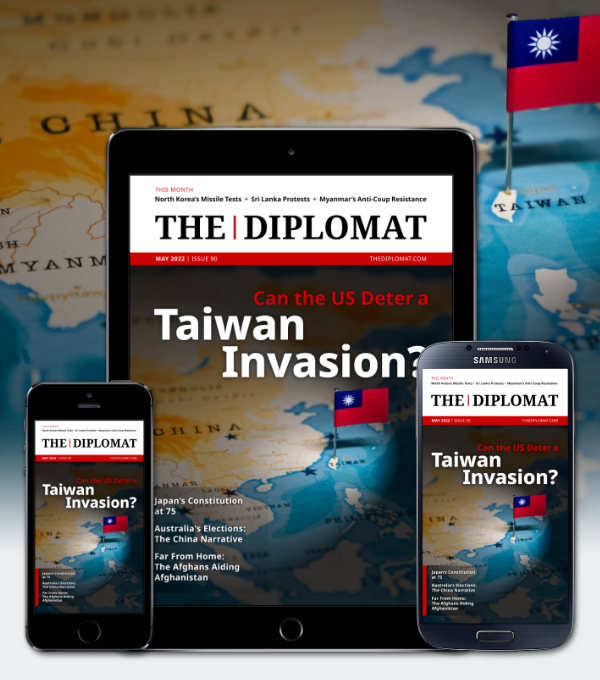| Welcome to the latest issue of Diplomat Brief. This week our top story looks at the contradiction between Vietnam’s embrace of Korean pop culture and the long-buried history of South Korean war crimes during the Vietnam War. We also have an interview with Dr. Alexander Korolev, a senior lecturer in politics and international relations at the University of New South Wales, Sydney, about China-Russia cooperation on defense technology. |
| Story of the week |  | SOCIETY K-Dramas Resurrect Long-Buried Memories in VietnamWhat Happened: South Korean dramas have captivated Vietnam, particularly the youth, with K-dramas accounting for 40 percent of all series on Vietnamese TV. But some Vietnamese have taken issue with K-dramas that feature heroic portraits of South Korean soldiers – for example, “Descendants of the Sun” – due to long-standing allegations of atrocities committed by Korean soldiers during the Vietnam War. South Korea not only staunchly supported the erstwhile government of South Vietnam but sent over 300,000 troops to take part in the war. That history has been largely forgotten in Vietnam, which calls the conflict the “Anti-American Imperialist Struggle” and has written other countries’ participation out of the historical narrative. Our Focus: To older Vietnamese, who lived through the war firsthand, the younger generation’s uncritical embrace of Korean TV is especially problematic, given Korean soldiers’ involvement in rape and civilian killings. “My children are addicted to Korean dramas, because the state TV has shown too many of them. They admire modern South Korea, yet they did not know that the fast rise of the country was partly thanks to the money paid by the American government for their dispatch of troops to Vietnam,” a former army officer told The Diplomat. “We have never heard that the South Koreans were involved in the anti-American war,” said a young tour guide from Quang Ngai province. “I only knew about the massacres in My Lai, and nothing about the Binh Hoa village massacre in my hometown.” What Comes Next: There have been some grassroots efforts in both Vietnam and South Korea to acknowledge and potentially redress atrocities committed during the war. Korean civil society organizations and individuals, such as the Korea-Vietnam Peace Foundation, have made prominent attempts to atone for past crimes, and Vietnamese activists – including some children born of rape by South Korean soldiers – have raised awareness through social media. But ultimately both the South Korean and Vietnamese governments seem content to look the other way and bury the troublesome aspects of the past in the name of current cooperation. Read this story |
| Behind the News | INTERVIEW Alexander KorolevDr. Alexander Korolev, a senior lecturer in politics and international relations at the University of New South Wales, Sydney, and the author of forthcoming book “China-Russia Strategic Alignment in International Politics,” on the shifting nature of China and Russia’s defense cooperation: “Russia is reconsidering its previous defense-equipment-for-cash model of military cooperation with China in favor of long-term cooperation projects that interlock military production in both countries and increase interdependence.” Read the interview |
| This Week in Asia | Northeast Asia South Korea’s New President Gets StartedSouth Korea has a new president: Yoon Suk-yeol took office on May 10. His inauguration address held few surprises, signaling a traditional conservative approach to North Korea (denuclearize first, then we’ll talk about economic aid). Meanwhile, China is watching warily to see how Yoon’s campaign rhetoric will translate to reality – as are South Korean women. Find out more | South Asia Sri Lanka’ PM Resigns; Is the President Next?After weeks of protest amid an unprecedented economic crisis, Sri Lankan Prime Minister Mahinda Rajapaksa has resigned. That fulfills one-half of the protesters’ most prominent demand – the other half would be the resignation of Mahinda’s brother, President Gotabaya Rajapaksa. Gotabaya has resisted the calls thus far, and Sri Lanka’s president is immensely powerful. But the protest movement seems to have entered a tipping point after Rajapaksa supporters attacked protesters. That only sparked more public support for the protest movement – as well as triggering violence targeting government ministers and their property. With the country now under a state of emergency, the next few weeks could be crucial. Find out more | Southeast Asia President Biden to Host ASEAN Leaders in WashingtonOn May 12-13, the U.S. president will convene the long-awaited U.S.-ASEAN Special Summit in Washington, D.C. The two-day meeting, which will be attended by representatives from all of the Southeast Asian bloc’s member-states, aside from military-ruled Myanmar, is intended to demonstrate the U.S. government’s enduring commitment to Southeast Asia in a context of rising strategic competition with China. Expect to see an agenda dominated by discussions of COVID-19 recovery, the Russia-Ukraine war, the crisis in Myanmar, and U.S. economic engagement with Southeast Asia. Find out more | Central Asia Constitutional Referendum Set for June 5 in KazakhstanOn June 5, Kazakhstan will hold a constitutional referendum, with proposed changes to nearly one-third of the document’s articles. The reform package is ostensibly aimed at shifting the country from a “super presidential” system to a “presidential system with a strong parliament.” Can the proposed changes actually accomplish that goal? (Hint: Probably not). Find out more |
| Visualizing APAC |  | In Kazakhstan, public opinion toward China has soured considerably since 2017 – the same year reports emerged of China’s crackdown on Turkic minority groups, including ethnic Kazakhs. See the full picture |
| Word of the Week | POLITICS ရွံစရာJun zaja: Burmese for “disgusting” or “loathsome,” the word has been increasingly used to describe Myanmar’s military since the 2021 coup. Find out more |
|  |





